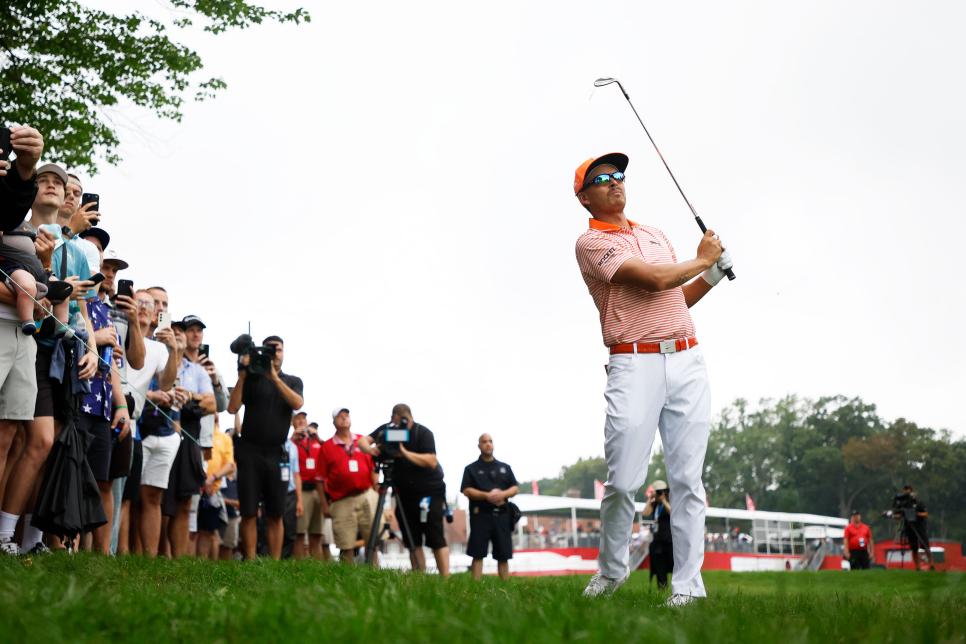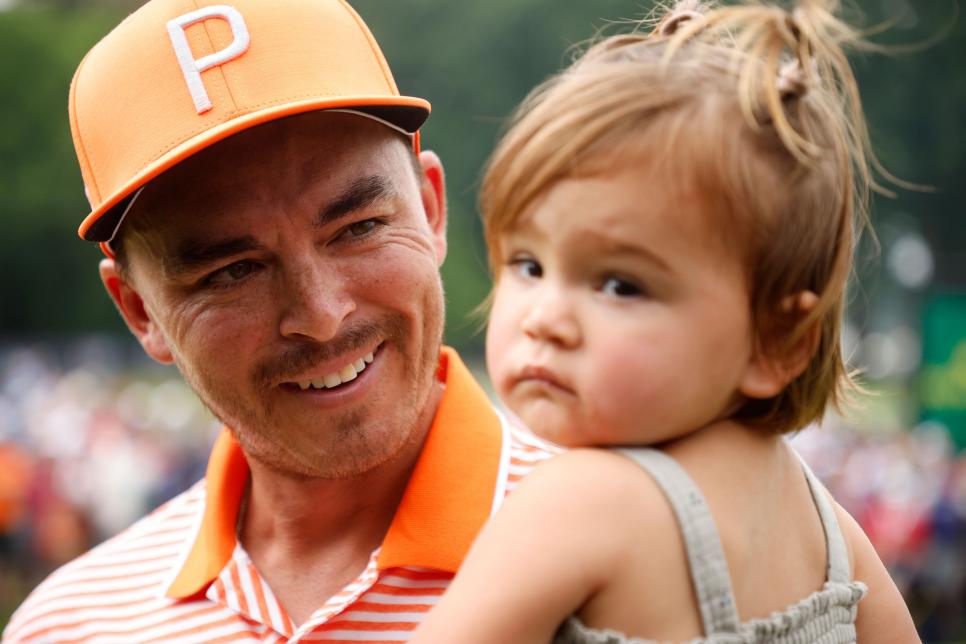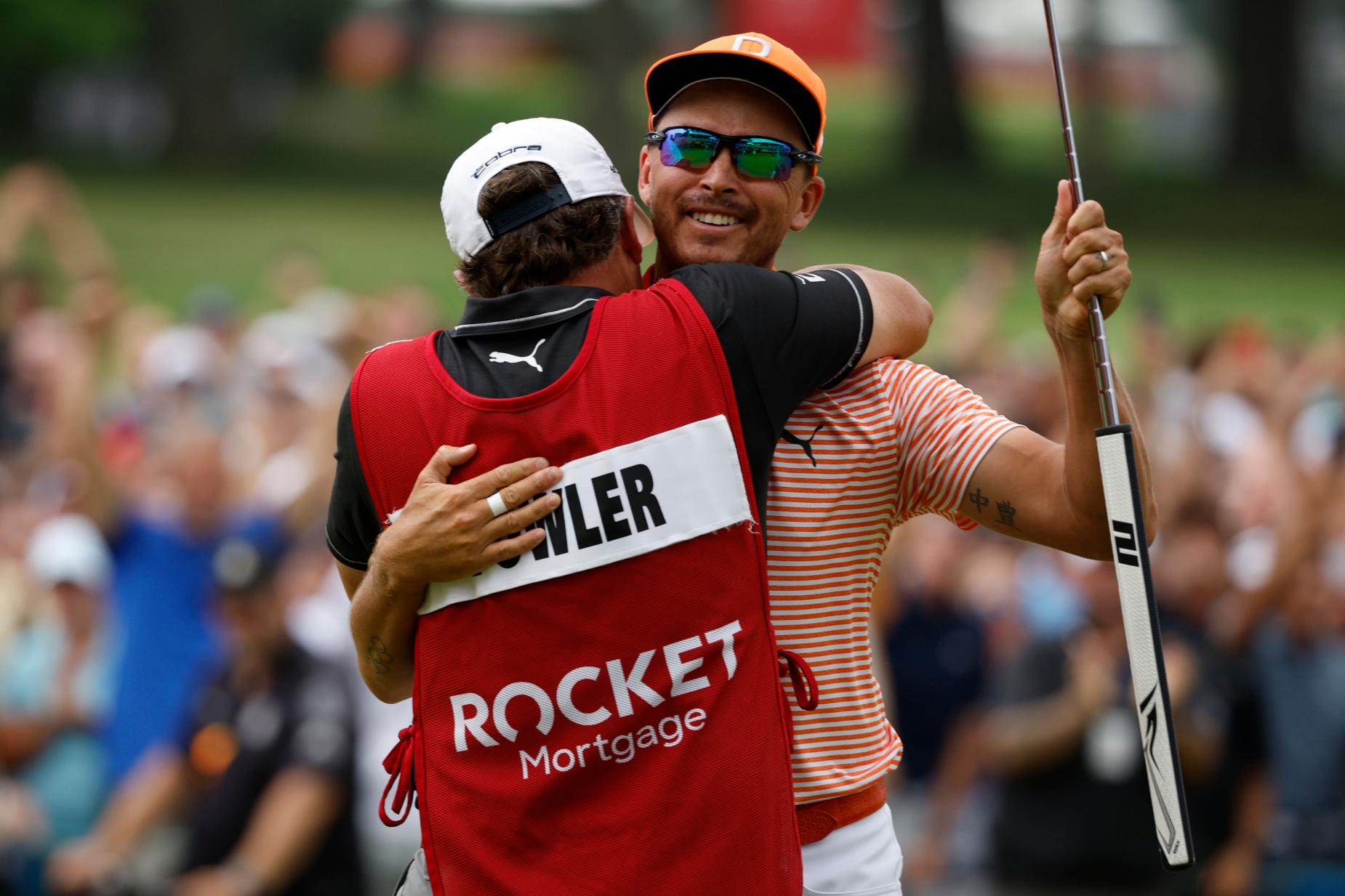Cliff Hawkins
Of all the painful ways to lose a golf tournament, “death by a thousand pars” has to be one of the most torturous. We’ve seen it most recently and prominently from Rory McIlroy at this year’s US Open and last year’s Open Championship, and we’ve seen it from Rickie Fowler on more than one occasion at majors in the past. The phenomenon is exactly what it sounds like: You’re not melting down, but you simply can’t make enough birdies to win, and par follows par in a slow, frustrating march of failure.
Sunday at the Rocket Mortgage Classic, before finally grabbing his first win in nearly four-and-a-half years and punctuating a comeback that has seen him rise into the upper echelons after a sustained slump that brought him as low as 185th in the world late last year, Fowler seemed to be mired in that old familiar morass. And if “death by a thousand pars” makes it tough to win a major, it’s an impossible formula for a PGA Tour stop like this one, an unrestrained birdie fest where you only triumph if you confront and dominate Detroit Country Club four times in a row.
Fowler’s start was anything but quotidian, but after three birdies in seven holes, he settled into the familiar slog. An astounding 10 straight pars from holes 8 through 17 took the air out of the Fowler faithful in the gallery, and brought a predictable consequence: the lead he carried into the mid-morning start (tee times were moved up due to a dire afternoon forecast) vanished as he stood on the par-4 18th. The hole had yielded precious few birdies, and now Fowler trailed Collin Morikawa and Adam Hadwin by a shot. While Fowler had been running in place, Morikawa was in a full sprint and nearly reached 25 under with a birdie putt on 18 that tantalized and then lipped out. Fowler appeared much like he had at Los Angeles Country Club, his body language telegraphing premature disappointment, and his drive to the intermediate rough on 18, while not a disaster, didn’t exactly help.
Then, just when deflation seemed to be the order of the afternoon, Fowler reignited his chances with what has to be one of the most important shots of his career, and certainly the most critical in recent memory. The brilliant approach came entirely against the run of momentum:
Clutch shot from @RickieFowler!
He has a 3-footer left to force a playoff @RocketClassic. pic.twitter.com/A5CvpZYaBI
— PGA TOUR (@PGATOUR) July 2, 2023
With that, Fowler did what he couldn’t do at the US Open, which was to conjure the perfect shot at the perfect moment. He later said he felt like his back was to the wall, and when he delivered under those tense circumstances, he was left with a gimme to make the playoff.
Moments later, facing Morikawa and Hadwin at 18 again as the first playoff hole, Fowler seemed to give the impetus right back to his opponents with a slice off the tee, while they hit perfect draws to the left side of the fairway. To his good fortune, though, the grass was tamped down by the gallery, and he had a relatively clean look at the hole. He took advantage, rolling his approach to 11 feet below the hole:
What a shot from @RickieFowler!
He’s left with a 11-footer for birdie @RocketClassic. pic.twitter.com/gnufBYIFIY
— PGA TOUR (@PGATOUR) July 2, 2023
The minute this second approach rolled to a stop, it was like the golf gods decided then and there that he’d been tested enough, and all the difficulties, all the struggles of the past years, evaporated in an instant, and the fates lined up on his side as lightning hovered outside the Detroit area. Hadwin over-spun his approach, leaving a long birdie putt that had the added trouble of giving Fowler a perfect read; Morikawa flew his even easier approach into the back rough and duffed the comeback ship; Fowler, facing down a putt to bury his winless demons, and telling himself to hit it hard enough, tucked it into the right side of the hole.
The brief look skyward, the breath that exhaled 1,610 days of futility just before his caddie Ricky Romano embraced him and the first smile appeared, probably said more than any words could, but Fowler had some good words anyway.
“It’s just been a long road,” said the now six-time PGA Tour winner. “I’ll get emotional at some point, whether it’s … in here or when we’re heading home or over this next week.”
RELATED: Here’s the prize money payout for each golfer at the 2023 Rocket Mortgage Classic
Fowler, 34, seemed to be teary-eyed as he held his 1-year-old daughter Maya in his CBS interview with Amanda Renner, but largely held it together later in front of reporters. He’ll head home for a few days now, and then to London for a pre-Open trip with Jordan Spieth, Justin Thomas and all their wives. But as he spoke Sunday, his mind was drifting to another European event a couple months after Hoylake.
“This was definitely one of the main goals this year was to win,” he acknowledged. “Outside of that … one of the end goals was to be a part of the Ryder Cup team, and that’s still what we’re focusing on right now. Been a part of a handful, and they’re very special weeks, so that’s where I have my eyes.”

Cliff Hawkins
When asked whether he always had confidence he’d return to the winner’s circle, Fowler answered with his usual honesty.
“Not always,” he admitted. “You never really know with this game. You definitely learn to appreciate the good times and when you’re playing well. Yeah, you hope the struggles don’t last, but sometimes they last longer than you would hope for … even when you’re playing well, it’s not going to last forever.”
While Fowler’s win will deservedly overshadow almost anything else that happened in Detroit this past week, the surprise resurgence of Morikawa might end up being almost as impactful.

Rickie Fowler celebrates with his daughter, Maya, after winning the Rocket Mortgage Classic. Cliff Hawkins
“Playoffs suck when you’re on the wrong side of them,” he said bluntly, but the rest of his post-round interview was almost effusively positive. “It’s kind of the old Collin hopefully back … I’m in this little lull and this hopefully is just that boost to just get me out of it.”
Morikawa will skip the Scottish Open and take more time to practice on the links to prepare for the Open Championship, and will hope that a return to form there and in the FedEx Cup playoffs rounds out his season in style and perhaps leads to a spot on the Ryder Cup team.
As for Hadwin, if he was disappointed in not winning—he’s now in the midst of a six-plus-year streak himself—you certainly wouldn’t be able to tell from his own presser.
“I’m stoked, I’m through the roof right now,” he said. “I mean, I got myself into a playoff at the end of the day, that’s what you want. You want a chance to win a golf tournament and I guess I kind of had a chance coming up 18, an outside chance. Then I hit two of the best golf shots I’ve hit all day in a playoff and really even that putt, it just didn’t go in. You know, I can take nothing but positives away from this week.”
It’s a rare tournament when everyone in the top three can feel good, especially after two of them have just lost in a playoff, but something was in the air in Detroit, and positive vibes were the order of the day. The last word belongs to Fowler, who hearkened back to that brief millisecond after the winning putt fell and he seemed to find a kind of quiet oasis; a storm’s eye between the stress he’d just endured and the celebrations to come.
“I was kind of just still and quiet and everyone was going crazy around me,” he said. “It was a nice moment just to kind of feel like the weight on my shoulders was finally off.”









